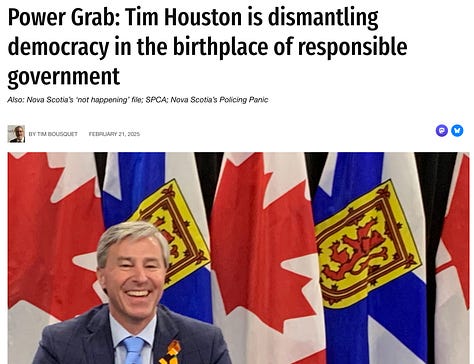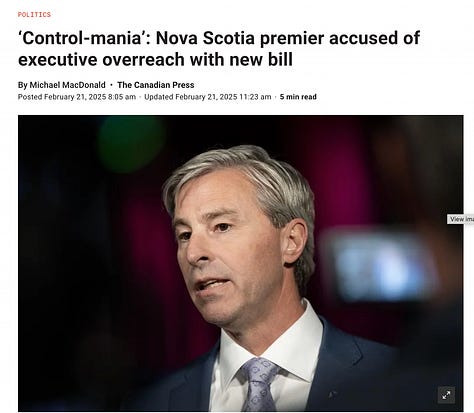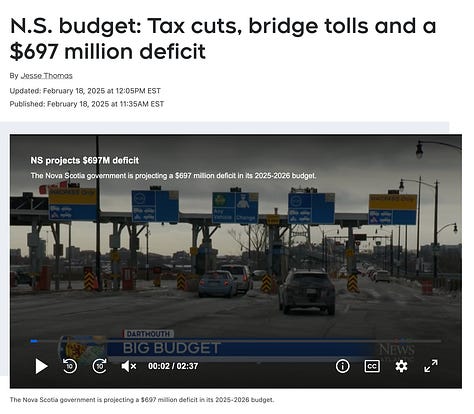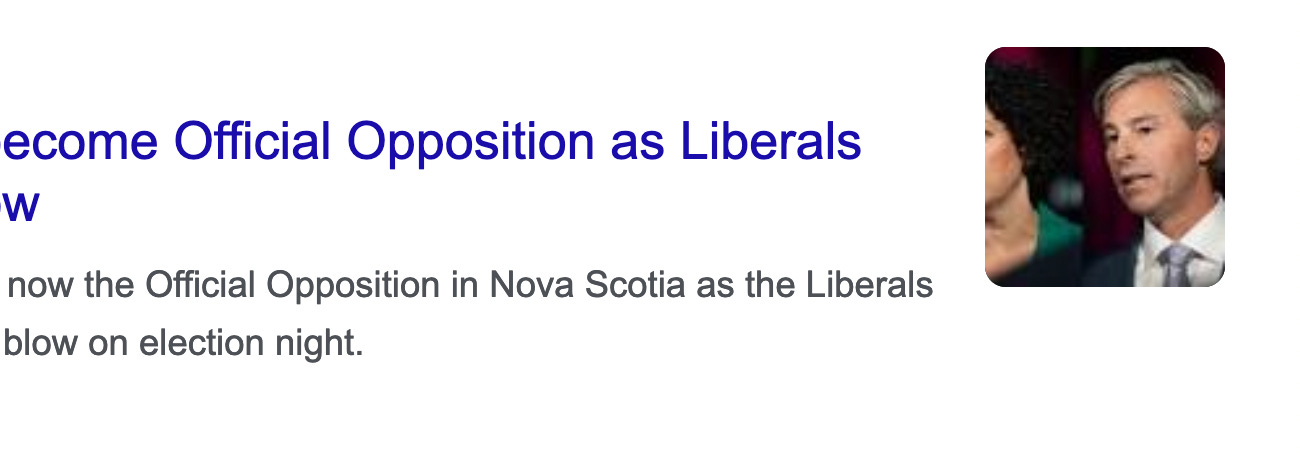Skating on Thin Ice: The Slippery Reality of Political Power
We say we want leaders to shake up the system—until they actually do. The brutal paradox of power—how politicians try to lead, serve, and survive, but usually fail at all three.
Nothing lasts forever—not winter, and not political goodwill. No job is more brutal, thankless, or impossible than being a politician. We demand vision, but punish ambition. We crave honesty, but reject hard truths. We want leaders who make bold changes—right up until those changes affect us.
This essay is about the impossible paradox of politics. Dani Rodrik would call it a Trilema: how to please the people, survive the system, and actually change things—when those three goals almost never align. It’s about why every political career, no matter how promising, eventually ends in failure, and why even the best leaders—those who genuinely try to fix what’s broken—are usually destroyed by the very people they serve.
Tim Houston is spending a lot… of political capital. In the span of three months and three crucial days, he’s gone from a record-breaking election win to a full-scale media meltdown. How did it happen? Why does it always happen? And more importantly—what does it mean for the rest of us?
Stick with me here, and by the end of this, you’ll see the game of politics for what it really is: a high-stakes, unwinnable battle between power, principle, and public perception.
The Most Loathed Profession: Why Politicians Sit at the Bottom of the Trust Hierarchy
No pursuit is more brutal than politics.
TikTok influencers and Instagram models may believe they are the peak specimens of attention-seeking behavior, but politicians have been at it for centuries—honing the craft of performative deception long before “content” became a thing. YouTube’s algorithm may have unearthed every Dunning-Kruger-afflicted amateur with a webcam, but politicians wrote the playbook on confidently delivering absolute nonsense with the gravitas of the Ten Commandments. Beauty pageants may be the final bastion of old-fashioned superficiality, but at least their contestants don’t pretend they’re solving inflation while they strut in evening gowns.
Used car salesmen get a bad rap for their slippery pitches and questionable guarantees, but they’re amateurs in the art of persuasion compared to the elected official who promises utopia while knowing full well he couldn’t organize a picnic without a subcommittee, a grant, and a scandal. Pop stars, who live and die by the whims of an audience that can turn on them in a single Spotify update, may believe theirs is the most fickle business in existence—but they’ve never seen what happens when a politician stumbles on a hot mic. Lawyers and priests, professions long regarded as snake pits of hypocrisy, at least maintain some illusion of moral authority. Freemasons might imagine they’ve found the most suspicious way to organize a Wednesday night book club, but they’ve got nothing on the secrecy of a government caucus meeting. And every beleaguered meat suit on OnlyFans might believe they’ve scraped the bottom of the barrel in the human dignity-for-cash exchange—but at least they’re honest about what they’re selling.
Politicians, however, inhabit a special category of contempt. No one is held in higher suspicion or lower regard. They are the only people who can simultaneously be accused of both doing nothing and doing everything wrong. The public views them as omnipotent, shadowy puppet masters—conjuring global conspiracies between catered lunches—while also believing they’re bumbling incompetents who couldn’t efficiently distribute a stack of post-it notes.
They are loathed across class lines. The rich find them meddlesome, the poor find them indifferent, the middle class finds them condescending, and every tax-paying entity suspects them of outright theft. The average citizen would trust a gambling addict to watch their savings before trusting a politician to handle a budget surplus. And yet, we keep electing them, because no matter how much we revile the political class, the alternative—actual democracy with 38 million people at the town hall meeting—is simply too much to bear.
At their best, politicians are charismatic bureaucrats—at their worst, well, history provides a long and bloody list. The job is a paradox: we demand they be visionaries but punish them for being ambitious. We want them to be honest, but also strategic. We expect them to fight for us, but only in ways that don’t upset our delicate sensibilities. They must campaign in poetry and govern in prose, but we’ll crucify them if they don’t somehow manage our affairs like a well-choreographed Broadway musical.
And perhaps the greatest insult? After years of public service, after the slings and arrows, the scandals, the impossible balancing acts, the betrayals, the compromises—after clawing to the top of this Machiavellian pyramid, they leave office and immediately transform into another despised creature: a lobbyist.
No pursuit is more brutal than politics. Because in the end, as we all learned in Taylor Swift’s now confusing 2014 1989 political treatise Blank Space, it isn’t just the political players we despise—it’s the game itself. And the game, unfortunately, is dealing with us.
In politics, all careers sooner or later end in tears. The lows are lower than the highs are high. And no place is more precarious than the verge of success, which is indistinguishable from the brink of disaster in a political career.









That Went Sideways Fast
I was painfully reminded of the horseshoes and hand-grenades nature of political life this week as the Nova Scotia legislature began its first sitting of 2025.
My friend Tim Houston, often ranked among the most popular premiers ever in Canada, after more than ten super successful years in public life, called an election in the fall that saw him returned to office with the biggest majority government in Nova Scotia’s modern history. Any way you looked at it, Tim reached the absolute top of what a political career could be.
187,047 votes out of 356,308 ballots cast, accounting for 52.49% of the popular vote.
Then less than three months later, with a few seemingly casual comments about changing mandates and just three days in the Nova Scotia legislature, he spent most all the political capital he had earned over a lifetime.
Today on your favourite social media account you would be hard-pressed to find a single Nova Scotian who voted for the Houston PC’s.
Thousands of hopeful, reasonable, fairminded good, and decent people are asking…
What happened? Why?
What goal did all this serve? What are we trying to achieve?
What are we supposed to think and do now?
And more… That’s not the deal we had!
I don’t have any insight beyond what I’ve written above. And, though I belong to the PC party, I am not party to, what I can only imagine were talks, plans, strategy sessions, and tactical discussions that got us here.
But for my own sake, and the queries of hundreds of people around me, let’s try together to make sense of what’s happening… without resorting to comparisons to Trump, Hitler, Nazis, and Fascists. And without calling it Disaster Capitalism as Tim Bousquet hyperbolically did in The Examiner last month and claiming, as he did today that Tim Houston is dismantling democracy in Nova Scotia, the home of responsible government. I mean… I want clicks, readers, and subscribers as much as the next guy but… as Jon Stewart said last week, there has to be some level of outrage below a hard TEN.
In the span of a week, Nova Scotia's political landscape has undergone a seismic shift, leaving many to question the rapid transformation under Premier Tim Houston's leadership. Wondering why these moves were contemplated and what they could achieve over the short four years until the next election. Once celebrated for securing a historic majority with 187,047 votes—52.49% of the popular vote—Houston's recent legislative maneuvers have ignited a firestorm of controversy and public outcry.
Central to the uproar is an omnibus bill introduced with alarming speed. Critics argue that this legislation grants the government unprecedented powers, notably the ability to dismiss the Auditor General without cause and to suppress public reports deemed unfavorable. David Johnson, a political science professor at Cape Breton University, described the move as "enormous and unwarranted executive overreach," suggesting a concerning consolidation of power within the Premier's office. Communication from the government and slogging through their release statements and the text of the bill itself does not give concerned citizen any alternative understanding, or even anything to go on.
Auditor General Kim Adair, long and openly at odds with the current government, voiced profound concerns, stating that the changes could lead to a lack of transparency and diminished accountability. She emphasized that reports critical of the government might never see the light of day, undermining the very foundation of democratic oversight.
SIDEBAR:
Auditor General Adair has been notably critical of the government's financial practices. She highlighted that over the past decade, approximately $7 billion has been spent outside the official budget process, with $1.38 billion in the 2023-24 fiscal year alone not authorized by a majority vote in the legislature. Adair has emphasized that Nova Scotia is unique in Canada for not requiring legislative approval for such extra-budgetary expenditures. She has consistently advocated for amendments to the Finance Act to mandate legislative votes on all government spending.
These pointed critiques suggest a degree of tension between the Auditor General's office and the current government. The proposed legislative changes, which could potentially undermine the independence of the Auditor General, may be viewed in the context of these criticisms. While the government asserts that the amendments aim to align Nova Scotia's practices with those of other provinces, the timing and nature of the proposals have led to speculation about possible motivations to curtail the Auditor General's oversight capabilities.
Further exacerbating tensions, the dissolution of Communications Nova Scotia has been perceived as an attempt to centralize and control governmental narratives. This move has drawn parallels to strategies employed by political figures south of the border, aiming to sideline independent communication channels in favor of partisan messaging.
The swift introduction and potential passage of these measures have left many Nova Scotians feeling blindsided. This wasn’t what we talked about. This isn’t the mandate. This is not the deal we had. The absence of extensive public consultation or debate has fueled sentiments of disenfranchisement and betrayal, especially among those who once supported Houston's vision.
In this turbulent climate, it's imperative to approach the discourse with measured analysis. While the actions of the Houston government warrant rigorous scrutiny, resorting to hyperbolic comparisons or alarmist labels can cloud constructive dialogue. As the province grapples with these developments, fostering an informed and balanced conversation remains essential to navigating the challenges ahead.
SIDEBAR #2: This whole thing is happening to the sound of plunking African electric guitars in my head and the lyrics of Paul Simon’s criminally under-appreciated song Proof (Poof, Proust) from the equally unappreciated album The Rhythm of the Saints.
Proof
Some people gonna call you up
Tell you something that you already know
Proof
Sane people go crazy on you
Say “No man that was not
The deal we made
I got to, I got to go”
Faith
Faith is an island in the setting sun
But proof, yes
Proof is the bottom line for everyone
What Just Happened?
Premier Tim Houston's Progressive Conservative (PC) government has embarked on a series of rapid and contentious policy initiatives, leaving many Nova Scotians bewildered and seeking clarity. The butterfly effect of this political metamorphosis could be attributed to the dynamics of a supermajority, the infusion of new political actors, and the permeating influence of broader conservative movements.
The Empowering Grip of a Supermajority
Securing 43 out of 55 seats in the legislature, the Houston administration commands a supermajority—something seldom discussed in Canadian politics and certainly not in Nova Scotia, a political juggernaut that enables unilateral decision-making without the necessity of opposition collaboration especially on procedural items. This concentration of power has facilitated the swift introduction of sweeping legislative changes, such as the controversial omnibus bill that critics argue centralizes authority and diminishes governmental transparency. The absence of a robust opposition presence has ostensibly emboldened the government to pursue an aggressive policy agenda with minimal legislative friction. And the only recourse the opposition has is to appeal to the public through media outrage. This is why the temperature is turned up so high on Bousquet’s boiling pot.
The Influx of New Political Influences
The recent electoral victory ushered in a lot of new legislators, advisors, and elite influencers, infusing the government with fresh perspectives and, ostensibly, a more assertive policy stance. Yes, Halifax has extrapolitical oligarchs, a permanent backroom elite who don’t show up in party rolls, but step up alongside any political movement that momentarily gets power. This infusion of new old blood may have accelerated the government's legislative momentum, as these actors seek to make their mark, settle old grudges, secure shadow projects, and sway policy. Bold new MLA’s may want to fulfill personal campaign promises fast. The rapid policy shifts suggest a strategic alignment among these new entrants, aiming to capitalize on their supermajority to implement their agenda swiftly.
The New Conservatives: External Conservative Currents
Progress doesn’t happen in a straight line. We careen from pillar to post. The public was taken as far left as it was willing to go and now it’s bouncing hard off that left bank to the right. The political zeitgeist beyond Nova Scotia's borders cannot be overlooked. The ascendancy of conservative figures such as Ontario Premier Doug Ford, federal Conservative Leader Pierre Poilievre, and former U.S. President Donald Trump has cultivated a line of talk that valorizes populist rhetoric and decisive governance. The Houston government's recent policy directions, including the centralization of communication channels and assertive legislative reforms, bear a resemblance to strategies employed by these figures. While direct influence is unlikely, the ideological consonance suggests a receptivity to broader conservative narratives that prioritize streamlined governance and a recalibration of traditional checks and balances.
It’s important to remember Conservative literally means to conserve, to control the speed of play with the goal of smaller government, and lower taxes. Not to say that’s clear here, but it is under the hood of the notion of conservativism.
It’s February and We’re Skating on Thin Ice
The confluence of an empowered supermajority, the energy of new political actors, and the resonance of external conservative ideologies have conjured a rapid and, to some, disconcerting transformation in Nova Scotia's political landscape. For many Nova Scotians, the challenge lies in reconciling the government's swift policy enactments with the principles of transparency, accountability, and democratic deliberation. As the province stands at this political crossroads, fostering informed and measured conversation remains the key to navigating the complexities of this evolving governance paradigm.
Is This the Worst, or the Only Way?
Tim Houston has taken a sharp turn, and no one—perhaps not even his own caucus—saw it coming. His once-untouchable political capital has burned faster than a firecracker too close to a wood stove. Three months ago, he stood at the top of the political world with a supermajority mandate and a winning smile. Today, he finds himself at the top of a Black Diamond run that, historically, ends with a resignation speech. The question on everyone's mind is simple but loaded:
What just happened?
Or, to put it another way:
Is this the worst, or is this the only way?
The Savage Precedent: A Warning from the Past
Dr. John Savage faced this same moment, nearly three decades ago. And we know how that story ended. A principled reformer, Savage was a surgeon in more ways than one—he cut deep into Nova Scotia’s bloated public sector, diagnosed a sick system, and tried to perform a full-scale operation before the patient woke up and started thrashing.
And he was punished for it. Not by voters directly, but by the very culture he sought to change.
Savage’s vision was radical, and in hindsight, correct. He saw an ossified bureaucracy riddled with inefficiency, a bloated public sector that could not deliver, and a system in which a political utopia of rules ensured that change was impossible. He understood that government needed to function more like a high-performing private enterprise: accountable, lean, innovative, and adaptable.
In a speech to the Empire Club in Toronto shortly after his election, he laid it out plainly:
“But to achieve our cost-cutting goals, programmes will be eliminated. There is no other way. In the weeks and months ahead, we face tough decisions.
We must maintain and improve delivery of those services Nova Scotians, indeed all Canadians, value most. Necessity demands that we eliminate, or fundamentally alter, the remainder. In Nova Scotia, an uncompromising review of every aspect of government is well advanced.
We have initiated management audits in seven major departments. They are being conducted by outside accountants with no vested interests. Only two have been completed so far, but already, the process is uncovering a maze of inefficiency, needless red tape, isolated bureaucratic empires, high stress, low morale, dismal productivity--in short, broken government, and an inefficient, rule-driven bureaucracy that is completely ill-adapted to respond to the demands of a world in transition.
The solutions include cutting out layers of bureaucracy; wholesale elimination of departments, agencies and divisions; decentralized decision-making; new management ideas and radically altered attitudes. It won't be easy.
Establishing working structures and systems to replace stifling bureaucratic controls is only half the equation--the easy half. Changing attitudes, altering the very culture of the public sector will be more difficult. The days of guaranteed job security, regardless of performance are gone. Productivity, creativity and flexibility will be requirements for success in the public sector, just as they are in private business. We will be hiring more senior managers on term contracts; bringing people in from the private sector to do a specific job. This would allow constant renewal, new ideas, new styles, a more vibrant workplace. Changes of this magnitude are frightening, there is no question. But they are also a source of new hope.”
But Nova Scotia’s bureaucracy—the “isolated bureaucratic empires” as he called them—did what bureaucracies do best: they waited him out. They resisted, obstructed, and, in the end, outlasted him. He was abandoned by his own party, vilified by the unions, and forced to resign in 1997. His legacy remains largely unrecognized, even though many of his policies—like the emergency health system and anti-patronage reforms—form the backbone of the province today.
What needs to be done has been clear since 1997 and the disease has only grown since then at every level of government along with a new near-government class of consultants and contractors, many now working from home and scattered across a wasteland of bleak accountability.
Houston, like Savage, seems to have realized that Nova Scotia's government is structurally broken. But unlike Savage, he has a supermajority and, at least in theory, the power to break the cycle.
The problem is that breaking things is easy. Replacing them with something better is the hard part.
A Different Playbook
If John Savage was the principled surgeon, Houston is playing a different role—one that feels closer to an amphibious invasion. The question is, is this D-Day or Dieppe?
Instead of incremental reform, his government has pursued a beach landing approach of epic scale, wading to the beach through controversial bills without consultation or warning.
Instead of persuading Nova Scotians that these are necessary sacrifices, he has left many feeling blindsided. His communications strategy appears non-existent. And in doing so, he’s alienated not just the bureaucrats but many of his swing supporters. There are simply not enough card-carrying PC’s in Nova Scotia to deliver the current majority. It came from voters of all sort who took a chance on a government that seemed as soft, centre, and ideologically benign as governments get in the its first term. And as the record low turnout revealed he got the vote-not-vote from a lot of people non-plussed with the Liberal and NDP offerings.
Savage’s government faced fierce opposition. Savage himself was accused of being authoritarian. He believed in the democratic process, but he just couldn’t communicate that AND do what he believed needed to be done. He tried to persuade. Houston, on the other hand, has a moment of power to bypass the need for persuasion altogether. When you have a supermajority, you don’t need to ask permission—you just do it.
But that’s also how you lose the people.
What’s Actually Happening?
The Supermajority Effect
When you hold a supermajority, you don’t need opposition votes, which means you can pass legislation at will. But the absence of opposition also removes the need for debate. And when you stop debating, you stop persuading. The risk? A party can become drunk on its own power, losing sight of the electorate entirely.
The Bureaucratic Counterattack
Every government that tries to gut bureaucracy faces resistance. Bureaucracies are designed to survive governments. Houston’s government may believe they are cutting through red tape, but the bureaucratic immune system is already working to neutralize the threat.
A Misread of Political Trends
Is Houston taking cues from Poilievre, Doug Ford, or Trump? I don’t think so. But those around him, now imagining they have regular roles in a season of THE WEST WING probably are. There are very few original thinkers in politics. But Nova Scotia is not Alberta or Florida. It is, historically, a centrist, pragmatic province that dislikes sudden and radical change. That’s literally why we like Progressive Conservativism. The Houston PCs campaigned on being “moderate conservatives” focused on problem-solving. The perception now? They are governing like ideological revolutionaries.
Where Does This Go?
If Houston is successful in his reforms, he could go down as one of the most transformative premiers in Nova Scotia’s history. If he fails, he could meet the same fate as John Savage—exiled by his own party, his legacy buried by the bureaucracy he tried to dismantle. And if the backlash continues, he might not even make it to the next election before the knives come out. In the first term he was famous for listening and changing course when the tide changed. Can he continue to do that if people speak out? Hard to say. We’ll see soon.
Is This the Worst, or the Only Way?
The bureaucracy in Nova Scotia is entrenched, inefficient, elite, and allergic to reform. That much is true. And if history is any indication, the only way to change it is through force—incrementalism has failed every time.
But there’s a difference between bold reform and reckless governance.
The lesson of John Savage is that reform must be paired with persuasion. You cannot simply impose change on a skeptical public—you have to sell it. You have to take people with you.
In politics, the perception of a problem is often as important as the problem itself.
The political adage “never solve a problem the public does not know exists” speaks to the reality that political capital is limited, and voters tend to reward leaders for addressing visible, pressing issues rather than abstract or hidden ones.
If a politician expends effort solving an unseen problem—no matter how urgent or consequential—it risks being misunderstood, unappreciated, or even resented for going in the wrong direction because... That's not the deal we had! Worse, revealing the problem in the course of solving it can create unnecessary panic, opposition, or political backlash.
Effective government prioritizes issues that resonate with the public, ensuring their efforts align with voter concerns and can be framed as decisive, beneficial action rather than obscure maneuvering.
Houston, caught up in a big new plan, tariff talks, and a pending federal election has a lot to think about.
So what should we do?
The answer depends on how long you can stay engaged. Let’s break it down.
In the Next Month: The Art of the Outrage Economy
(Don’t get distracted, don’t get manipulated, and definitely don’t get played.)
Ignore the Performative Rage – Social media is about to explode with both over-the-top outrage and equally ridiculous defenses. Neither will be helpful. If you see people invoking Trump, Hitler, fascism, or secret globalist conspiracies, dismiss them outright.
Get the Real Story – Don't rely on political spin (from anyone - definitely not me). Read actual government documents. Follow independent journalists who aren’t just farming clicks. Here’s the link to the actual Bill#1 And here are statements from the government and with links to the budget and other source documents.
Demand Answers, Not Platitudes – If a government MLA says, “We’re making tough choices,” ask why these specific choices and not others. If they say, “This is about efficiency,” ask how much money they’re actually saving and where it’s going.
Show Up – Community meetings, town halls, letters to MLAs—Nova Scotia is small enough that public pressure works. Don’t wait for the next election.
Beware the Next Shiny Thing – If things keep getting heavier, expect the government to suddenly find a major distraction—maybe a new megaproject, a healthcare shakeup, or a headline-grabbing fight with Ottawa. Recognize when you’re being played.
In the Next Quarter: Keep the Fire Hot, but Controlled
(Nova Scotia has a long history of anger burning fast, then dying out. Don’t let that happen.)
Identify the Power Brokers – Houston’s government is being influenced—but by whom? Which advisors, lobbyists, or behind-the-scenes players are steering policy? These are the people who never leave government, even when premiers change. Find out who they are. Bureaucrats do have names and faces… though you’d never know it.
Use Economic Pressure – If certain companies or industries benefit from these changes, make it clear that public opinion has consequences. Support businesses that align with community values.
Challenge the Bureaucratic Shell Game – Governments love to restructure departments instead of solving problems. If they start renaming things and shuffling leadership while keeping the same inefficiencies, call them on it.
Bridge the Political Divide – This isn’t about left vs. right. It’s about whether Nova Scotia works for Nova Scotians or just for the political class. Find allies across political lines who care about transparency, accountability, and local decision-making. Partisan spoiler alert - We all love our families, home, and friends. We all love Nova Scotia and want it to be a better place for the rising generation… no matter what anyone says.
Create an Independent Information Ecosystem – Stop relying on traditional party-aligned media sources. Encourage more investigative reporting, citizen journalism, and well-researched public debate. The Examiner shouldn’t be the only voice doing hard political analysis.
In the Next Year: Build a Strategy Beyond Just Complaining
(It’s not enough to be mad. If you want to change things, you need a plan.)
Recruit Better Candidates – If we want to break the cycle, we need people running for office who actually understand how to fix bureaucracy—not just ride party waves.
Make Government More Transparent – Push for stronger public reporting, citizen oversight, and actual teeth in accountability measures. Demand real consequences for bad governance.
Organize for the Long Game – Right now, Houston is holding a winning hand. But that’s temporary. Politics is always temporary. That’s the whole idea. Political power shifts when public frustration turns into organized action. If you don’t want the same thing happening under a different leader in four years, start building an alternative now.
Rewrite the Deal – The reason people are so angry right now is because this isn’t the deal they signed up for. The government campaigned as moderate problem-solvers and is now ruling, in the view of many, like ideological disruptors. That betrayal is what makes this moment different.
Hold the Next Government Accountable, Too – If Houston crashes and burns, someone else will take his place. That next leader will promise to “restore trust” and “do better.” Make sure they actually do.
Call to Action: Get Over Yourself and Join a Damn Party
Democracy isn’t a Netflix subscription—you don’t get to just watch and complain when the plot goes sideways. Political parties, for all their flaws, are the only real mechanism for shaping who gets power and what they do with it. If you’re mad about what’s happening, and you’re not a member of a party, congratulations—you’ve chosen to be a spectator while the insiders make the rules.
The hyper-individual era has tricked us into thinking that belonging to anything is a surrender of independence. That’s nonsense. Power belongs to those who organize, and right now, that’s a small group of party loyalists while the rest of us tap angry half-sentence responses vamping simpatico with our smart friend who nobody really like’s social media posts.
So, pick a party. Show up. Vote in the nomination races. Push for better candidates. Be in the room where it happens. Because if you don’t, someone else will be—and they probably don’t share your priorities.
Democracy is a contact sport married to a math class. But you can’t just get an arts degree at a good school and say you don’t like math and sports. You gotta play.
Final Thought: Stay Sharp, Stay Engaged, Stay Relentless
Nova Scotians don’t need to be told to be skeptical of government. That’s built into the DNA here. But skepticism without strategy is just a grumble at the coffee shop.
If we really believe “That’s not the deal we made,” then we need to start writing a new one.
READING:
https://www.halifaxexaminer.ca/morning-file/power-grab-tim-houston-is-dismantling-democracy-in-the-birthplace-of-responsible-government/
https://www.facebook.com/share/p/1B7hgJ88za/
https://globalnews.ca/news/11028740/nova-scotia-premier-accused-overreach-new-bill/
https://www.cbc.ca/news/canada/nova-scotia/progressive-conservatives-government-auditor-general-1.7462166
https://www.halifaxexaminer.ca/morning-file/the-erosion-of-democratic-norms/
https://www.halifaxexaminer.ca/morning-file/mediocre-white-men-will-be-the-end-of-us/
RELATED:
Should Nova Scotia Invest in Lithium Mining?
Lithium Mining in Nova Scotia - A Brief (that’s actually brief) Investment Perspective For Discussion
WTF - What The Frack?
Fracking, short for hydraulic fracturing, is the process of using a high-pressure mix of water, sand, and chemicals to release oil and gas from deep underground. Now, you might be thinking, “How bad can fracking really be? It produces natural gas! That sounds natural enough.”
The Paradox of Progressive Conservatives
Progressive Conservative. It’s the Jumbo Shrimp of political parties.









